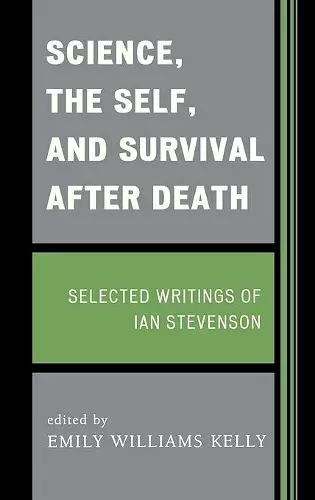Science, the Self, and Survival after Death
Selected Writings of Ian Stevenson
Format:Hardback
Publisher:Rowman & Littlefield
Published:21st Dec '12
Currently unavailable, and unfortunately no date known when it will be back

Ian Stevenson was a prominent and internationally-known psychiatrist, researcher, and well-regarded figure in the field of psychical research. Science, the Self, and Survival after Death is the first book devoted to surveying the entirety of his work and the extraordinary scope and variety of his research. He studied universal questions that cut to the core of a person’s identity: What is consciousness? How did we become the unique individuals that we are? Do we survive in some form after death? Stevenson’s writings on the nature of science and the mind-body relationship, as well as his empirical research, demonstrate his strongly held belief that the methods of science can be applied successfully to such humanly vital questions. Featuring a selection of his papers and excerpts from his books, this collection presents the larger context of Stevenson’s work and illustrates the issues and questions that guided him throughout his career.
The growing research on the whole expanse of human experience owes a big debt of gratitude to Stevenson’s lifelong, conscientious work. Readers interested in the many questions addressed by Stevenson will benefit from his very considerable knowledge and insights, but I would also recommend the book to graduate students in psychology and related areas, to counter the notion that the only way to increase our knowledge of the human condition is by tackling easy problems in a laboratory setting. Emily Williams Kelly has reminded us of Stevenson’s important contributions and of the challenges still facing those willing to research all of human experience * PsycCRITIQUES *
This selection from his writings, together with Kelly’s informative introductions, demonstrates that psychical research, liberally conceived, has the potential to enrich the psychological and biological sciences. . . .Emily Kelly deplores both the dogmatic adherence of religious fundamentalists to their particular stories of the place of humanity in nature and the uncritical adoption of dubious ideas of magic and the paranormal by New Age believers. She is equally critical of scientific dogma that rejects evidence suggestive of anything that does not fit the current materialist paradigm. She sees the importance of Stevenson’s work as calling attention to data that may lead to an expansion of scientific understanding of interrelationships of the mental and the physical. * Journal of the Society for Psychical Research *
This book shows Stevenson in an impressive way, not only as unflinching researchers, but it also illustrates his unprejudiced wealth of ideas, which makes it very worth reading and highly recommended. It also includes extensive bibliographies for each chapter, a glossary, and the handsome long list of Stevenson's scientific publications. * Zeitschrift für Anomalistik *
An extremely valuable resource. It nicely captures the broad scope of Ian Stevenson’s interest and expertise, and it’s absolutely essential reading for serious students of the evidence suggesting postmortem survival. -- Stephen Braude, professor emeritus of philosophy, University of Maryland Baltimore County, and author of Immortal Remains: Evidence of Life after Death
Ian Stevenson is one of those legendary figures who has played a more and more significant role in the anthropology and psychology of religion over the years, if usually only in brief appreciative references and admiring footnotes. With this wonderful new collection of his essays, Stevenson “steps out” in front of the curtain, as it were, and takes his rightful place as a major thinker and researcher. Emily Williams Kelly has performed a major service to numerous fields here. -- Jeffrey J Kripal, author of Authors of the Impossible: The Paranormal and the Sacred
A major intellectual figure of the 20th century, Stevenson’s contributions and influence are destined to be even more profound in the 21st century than during his long and productive life. As Kelly astutely shows, Stevenson did not seek a “new science” or special exemptions from scientific method for his studies of remarkable evidence for such concepts as ESP or reincarnation. Rather he used the tools of science to show that rigor in these investigations is the best way to develop a fully rational understanding that is not reductive. This book is both a wonder of intellectual history and a wellspring of ideas for those who today continue the effort to reconcile the apparent disjunction between rigorous science and the most extraordinary aspects of human experience of the world! -- David J Hufford, Pennsylvannia State University
ISBN: 9781442221147
Dimensions: 235mm x 161mm x 36mm
Weight: 771g
424 pages